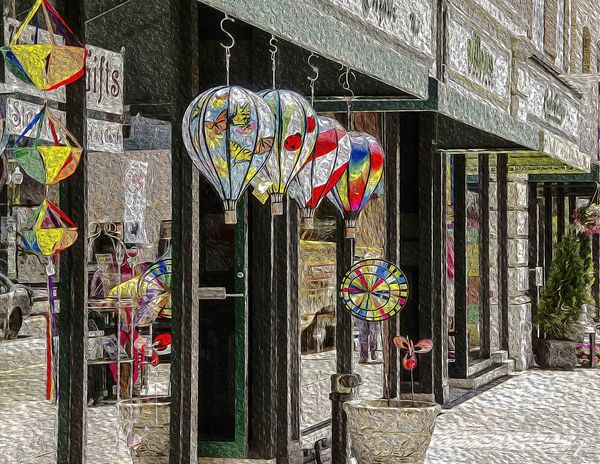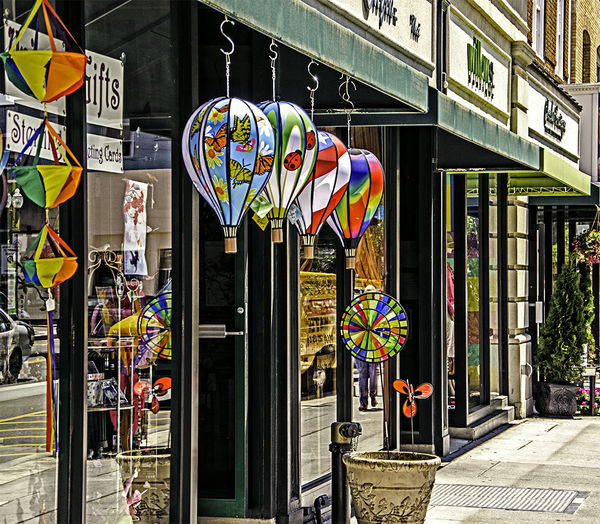At what point does photography end?
Aug 9, 2013 07:28:06 #
At what point does photography end and computer "animation" begin? I ask only because there is some mention of photoshop or other editing software daily in this forum. It seems that today even a "bad" picture can be made good by a person on a computer. A graphic arts degree in hand can aid that photo in becoming a great picture. Presently there are courts that will no longer accept photographic evidence due to the ability of a photoshop artist in manipulating the evidence. Why is it we spend as much if not more to buy a computer and software to edit the art we created or better yet captured on "film" or actually digital memory card and a box of circuits and resistors?
Aug 9, 2013 07:32:54 #
Good question! The vast majority of my photos have NO post processing, with the possible exception of some cropping. Once in a while some adjustments due to extreme contrasts in lighting, etc, but that is rare.
Like in film days, I preferred to "get it right" in the camera. Not always possible, but with today's equipment there is even less reason for not getting it accurate out of the camera. Anything else becomes "artistic manipulation" IMHO.
Like in film days, I preferred to "get it right" in the camera. Not always possible, but with today's equipment there is even less reason for not getting it accurate out of the camera. Anything else becomes "artistic manipulation" IMHO.
Aug 9, 2013 07:38:46 #
Mason Jar wrote:
At what point does photography end and computer &q... (show quote)
Processing began when the first photo was developed.
I got into SLRs in the '70s because I liked the control and the technology. I got into computers for the same reason. Combine the two, and you have a beautiful combination to make a good picture even better.
You can't make a silk purse out of a sow's ear, but you can make it presentable. If you start with a silk purse and process it a bit on a computer, you can make it outstanding.
Speaking of photographic evidence, it must be straight out of the camera, with no processing, and that can be tricky. Like eyewitness testimony, photographic evidence has become questionable.
Aug 9, 2013 07:42:50 #
Mason Jar wrote:
At what point does photography end and computer &q... (show quote)
If you consider yourself an "image maker", then what difference do the tools you use make?
Photoshop and a graphic arts degree don't guarantee that the result is a great image; it could just be a high-tech piece of junk.
If you're looking for "accuracy" of image, you can get a bad image by just using a bad set of exposure values. For a photographic image to be used in court, you still have to follow the "rules of evidence". This could mean turning over the memory card to the evidence chain immediately after shooting the image and then maintain a continuous chain of possession right up to the time of court appearance.
Aug 9, 2013 08:02:18 #
It's all an art form. You are the chooser of what you like, and I choose what I like. If anyone objects to either choice, then that's their opinion, and doesn't make either of our choices right or wrong ... unless they are paying us for our creations.
Aug 9, 2013 08:06:30 #
The computer has taken the place of the dark room in the film days. Not everyone owned a darkroom and those that did not sent their exposed film out for development. When other labs developed your film some did not do any touch up on the prints other labs did (I used National Color Lab who did some processing on my behalf). I also owned a B&W darkroom had a Bessler enlarger and many other equipment in my dark room, I did post processing (dodge, burn, un-sharpen mask and many other dark room procedures). My point being is that todays photography is no different than yesteryear photography in respect to procedure, those that don't want to PP usually shoot in JPEG those that want to PP usually shoot in RAW (which is a negative unprocessed), however unlike having a negative to enlarge and print in a darkroom we use the computer to do the work, or take your card containing JPEG's to a Cosco, walmart or someplace else to have someone else do it for you.
Mason Jar wrote:
At what point does photography end and computer &q... (show quote)
Aug 9, 2013 08:30:54 #
Wahawk wrote:
Good question! The vast majority of my photos have NO post processing, with the possible exception of some cropping. Once in a while some adjustments due to extreme contrasts in lighting, etc, but that is rare.
Like in film days, I preferred to "get it right" in the camera. Not always possible, but with today's equipment there is even less reason for not getting it accurate out of the camera. Anything else becomes "artistic manipulation" IMHO.
Like in film days, I preferred to "get it right" in the camera. Not always possible, but with today's equipment there is even less reason for not getting it accurate out of the camera. Anything else becomes "artistic manipulation" IMHO.
Very well said and I agree 100%, cropping and red eye removal and a contrast adjustment if that's all that's spoiling the photo.
Once a photo starts to look like a painting it loses its true meaning.
Aug 9, 2013 08:33:07 #
dooragdragon wrote:
Very well said and I agree 100%, cropping and red eye removal and a contrast adjustment if that's all that's spoiling the photo.
Once a photo starts to look like a painting it loses its true meaning.
Once a photo starts to look like a painting it loses its true meaning.
Which brings up the topic of B&W photography. Even those who are color blind don't see the world in B&W. That's certainly not "the way to eye sees it."
Aug 9, 2013 09:07:28 #
Mason Jar wrote:
At what point does photography end and computer "animation" begin?
If, by "computer animation", you mean post processing, it's all one and the same. One cannot get a digital photograph without some degree of post processing. The camera does a bit of processing before it hands you that JPG file. The extent to which one might process an image depends on a lot of things. Some folks just aren't computer-savvy, which means it's an uphill struggle to post process. Some folks just don't want to expend the money for post-processing software, then learn to use it, and that's okay if they are satisfied with the JPG the camera hands them.
Film set natural limits on what could be done to embellish/correct the photo. Digital photography removed many of those limits.
I certainly don't criticize those who want to collect their photos that are straight out of the camera, but I will say that every one of those photos can be made more attractive and presentable when some tweaks are applied.
Aug 9, 2013 11:07:08 #
Mason Jar wrote:
At what point does photography end and computer &q... (show quote)
Post-processing is no less of an art than photography. They compliment each other. Ansel Adams was considered a master of both and spent a great deal of time in his custom built darkroom post-processing his images.
Aug 9, 2013 11:21:47 #
dooragdragon wrote:
Very well said and I agree 100%, cropping and red eye removal and a contrast adjustment if that's all that's spoiling the photo.
Once a photo starts to look like a painting it loses its true meaning.
Once a photo starts to look like a painting it loses its true meaning.
What tools does the viewer have to determine"true meaning". Then again, how does one determine when a photograph begins to look like a painting - is it not a continuum of opinion. And for many, that presents no problem at all.
We get a great variance of opinion around here. That is because photography is more than a technical exercise - it is an art form.
Opinion should not be the cloak of fact
Aug 9, 2013 11:42:34 #
Two views same subject, some people like the painted look (I have sold about a dozen of this picture), while no one wanted the one straight from the camera.
lightchime wrote:
What tools does the viewer have to determine"true meaning". Then again, how does one determine when a photograph begins to look like a painting - is it not a continuum of opinion. And for many, that presents no problem at all.
We get a great variance of opinion around here. That is because photography is more than a technical exercise - it is an art form.
Opinion should not be the cloak of fact
We get a great variance of opinion around here. That is because photography is more than a technical exercise - it is an art form.
Opinion should not be the cloak of fact
Painted look

As shot from the camera.

Aug 9, 2013 12:18:39 #
Wahawk wrote:
Good question! The vast majority of my photos have NO post processing, with the possible exception of some cropping. Once in a while some adjustments due to extreme contrasts in lighting, etc, but that is rare.
Like in film days, I preferred to "get it right" in the camera. Not always possible, but with today's equipment there is even less reason for not getting it accurate out of the camera. Anything else becomes "artistic manipulation" IMHO.
Like in film days, I preferred to "get it right" in the camera. Not always possible, but with today's equipment there is even less reason for not getting it accurate out of the camera. Anything else becomes "artistic manipulation" IMHO.
To say that the vast majority of your photos are not post processed is disingenuous. Every photo you take is post processed. Your camera takes an image in RAW format and converts it into a JPEG which is adjusted to meet the white balance and style settings you have set on your camera. i.e. Standard (vivid colors with medium high saturation, high level of sharpening, high contrast) Portrait (Low sharpness, skin tone enhancements, medium saturation, high contrast) Landscape (High saturation for blues and greens, high sharpness) Neutral (lower saturation and contrast). Doesn't this sound like post processing?
Unless you are shooting RAW and simply printing the unprocessed file which would result in a dull, lifeless, unsharpened and possibly noisy print.
I shoot RAW and import my pictures into lightroom and apply a preset that adjusts the photos to my basic ideas of contrast, saturation, noise reduction and sharpening. I then tweak the settings to bring the image closer to my vision of the scene. How is your method any better than mine?
The line between a straight photograph and an artistic manipulaton is gray and very broad and is therefor open to personal interpretation and taste. Certainly there are people who take post processing manipulation to a very high level. Who are we to say that this is right or wrong?
Aug 9, 2013 12:47:05 #
Mason Jar wrote:
Presently there are courts that will no longer accept photographic evidence due to the ability of a photoshop artist in manipulating the evidence.
Which courts?
None that I know of.
Individual judges on individual cases, yes.
There are strict rules about what can or cannot be done to an image being submitted as evidence. And every edit must be documented.
Aug 9, 2013 12:59:55 #
dooragdragon wrote:
Very well said and I agree 100%, cropping and red eye removal and a contrast adjustment if that's all that's spoiling the photo.
Once a photo starts to look like a painting it loses its true meaning.
Once a photo starts to look like a painting it loses its true meaning.
I simply cannot agree that if an image is processed to have a painterly feel that it loses "true meaning", and feel that statement is very much a gross over-generalization at the very least. In fact, I would submit that there are definitely times when the exact opposite is true, and that PP to get a painterly effect may strongly add to the "meaning" of the image.
As an example, I sell a number of images of old cars and trucks. Each has been very pain-stakenly hand processed using a digital tablet, to have textures similar to water colors or pastel chalks in some areas. I do this intentionally to help establish the nostalgic component (true meaning?) of the image. I believe that the stark reality of the original photo has a tendency to jar people back into the here-and-now for these subjects. I want them to experience the image in a manner more "out of current time", and the addition of painted texture or color helps me to accomplish this.
If you want to reply, then register here. Registration is free and your account is created instantly, so you can post right away.










